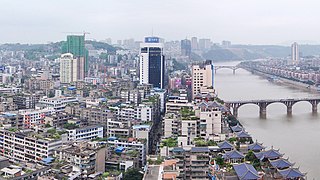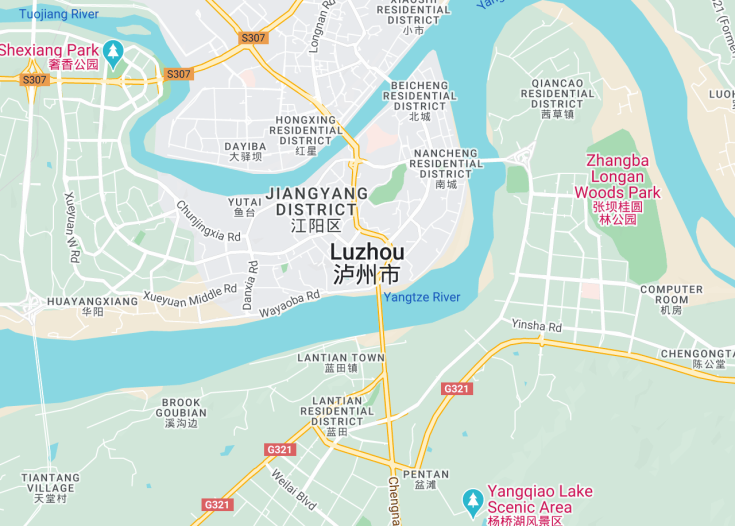Luzhou, located at the confluence of the Yangtze and Tuo Rivers in China’s Sichuan Province, offers a rich blend of cultural heritage and modern development. Known for its ancient distilling techniques, Luzhou is famed for its Baijiu, a traditional Chinese liquor. Visitors can explore historical sites like the Luzhou Laojiao distillery, which dates back to 1573, providing insights into the city’s extensive legacy in Baijiu production. Aside from its spirited tradition, Luzhou captivates with its lush riverbanks and vibrant city life, making it a unique destination for travelers seeking both historical depth and contemporary charm.
Discover Luzhou’s old town, an area filled with authentic Sichuan cuisine and traditional architecture, perfect for cultural immersion.
Consider visiting during the Baijiu Festival in September when Luzhou comes alive with festivities, showcasing local customs and Baijiu tasting sessions.
Top things to do & see in Luzhou
Select the following sights and activities to discover best tickets and tours available in Luzhou.
Luzhou: The Gateway to Southern Sichuan
| Country | China |
| Time in Luzhou | GMT+8 |
| Language spoken | Mandarin Chinese |
| Population | 4.8 million (source: China Statistical Yearbook) |
| Currency | Chinese Yuan (¥, CNY) |
| Airports |
|
Luzhou, located in Sichuan Province, China, is a fascinating city with a rich history and vibrant culture. Known for its unique geographical position at the convergence of the Yangtze River and Tuo River, Luzhou has been a significant hub in southern Sichuan for centuries. Historically, it has served as a critical waterway junction, contributing to its development as a regional trade and logistics center. The city is also famous for its baijiu (Chinese liquor) production, which is among the best in China, with Luzhou Laojiao being one of the oldest distilleries in operation since 1573.
Modern-day Luzhou offers a blend of traditional charm and rapid urban development. Visitors can witness this transformation in the city’s bustling river ports, well-preserved ancient town, and the growing skyline filled with modern architecture. The city’s emphasis on cultural preservation alongside urbanization makes it an intriguing destination for both domestic and international tourists.
Where is Luzhou?
Luzhou is strategically located in the southern part of Sichuan Province, bordered by Chongqing to the east and Guizhou to the south.
Distances:
| Route | Distance by car | Time by car |
|---|---|---|
| Chengdu to Luzhou | 146 miles (235 km) | Approximately 3 hours |
| Chongqing to Luzhou | 103 miles (166 km) | Approximately 2.5 hours |
What is Luzhou famous for?
Luzhou is renowned for its iconic baijiu industry. The city’s long-standing distilling techniques and high-quality sorghum liquors are celebrated throughout China and increasingly abroad, making it an essential location for liquor enthusiasts.
History
Ancient Era: Prehistory-618 AD
Luzhou, located in Sichuan Province of China, has a rich history dating back to its first settlers during the prehistoric period. Archaeological findings, including various stone tools and pottery, suggest that early humans inhabited this area. The region was known as Jiangyang, and its development was significantly influenced by its geographical location near the Yangtze River, fostering early agricultural practices and trade.
Imperial China: 618-1912 AD
During the Tang and Song Dynasties, Luzhou became an important military and administrative center, a status it maintained throughout various dynastic eras. The city was renowned for its salt industry, which played a crucial role in the economic development of the region. The Ming and Qing Dynasties saw further development as Luzhou acted as a vital transportation and commercial hub in Southwest China, dealing in goods such as silk, spices, and, most notably, its famed liquor, Luzhou Laojiao, which remains a cultural emblem.
Modern Era: 1912-Present
Luzhou experienced significant changes with the fall of the Qing Dynasty and the rise of the Republic of China. During the 20th century, the city underwent industrialization, particularly in the brewing industry, which greatly enhanced its economy. In contemporary times, Luzhou continues to expand with modern infrastructure while maintaining its cultural heritage, making it a unique blend of ancient and modern Chinese lifestyles. The city’s role in regional politics and economics remains strong, with ongoing development in education, technology, and transportation sectors.
Visit Luzhou
What to see and do in Luzhou
Luzhou invites visitors to explore its rich historical and cultural landscape. Key attractions include the Luzhou Laojiao Tourist Area, where you can learn about the traditional brewing techniques of one of China’s oldest liquors. The Longmatan District offers scenic beauty and a glimpse into local life, while the Luzhou Museum hosts artifacts that narrate the city’s intriguing past. For nature enthusiasts, a visit to the Yangtze River scenery is a must. Explore these sites:
- Luzhou Laojiao Distillery
- Longmatan District
- Luzhou City Museum
- Yangtze Riverfront
Festivals and Events in Luzhou
Luzhou hosts several cultural and festive events reflecting its rich heritage. Noteworthy among them is the Chinese Baijiu Festival, held annually in September, celebrating Luzhou’s storied liquor industry. The Spring Festival and Mid-Autumn Festival are also grandly celebrated, showcasing traditional performances, rituals, and culinary delights.
Best time to visit Luzhou
The optimal time to visit Luzhou is during spring (March to May) and autumn (September to November). These seasons offer mild weather and scenic natural beauty, ideal for exploring outdoor sites and participating in local festivals.
Is Luzhou worth visiting?
Luzhou offers a captivating mix of historical gravitas and cultural richness. It is particularly appealing for those interested in the traditional Chinese liquor industry and regional history. The city’s scenic landscapes along the Yangtze River provide stunning natural vistas.
However, visitors should be prepared for the bustling nature of an industrial city and relatively fewer Western tourists’ amenities. Overall, Luzhou provides a deep dive into an authentic, less commercialized Chinese experience, making it worthwhile for those seeking depth in their travels.










